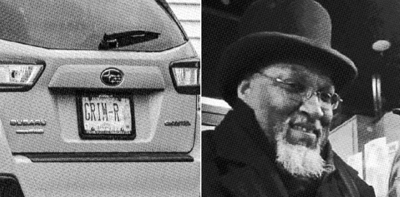
Cedric Lodge and his license plate
WILLIAMSPORT, Pa. - A woman who bought faces and skin from the former morgue manager at Harvard Medical School has lost her argument that she can't be criminally charged.
Williamsport, Pa., federal judge Matthew Brann on July 22 refused to dismiss the indictment against Katrina Maclean, who operates a store called Kat's Creepy Creations in Massachusetts. Her involvement with Cedric Lodge led her to being one of a handful of individuals indicted by federal prosecutors in 2023.
The charges are premised on the interstate transportation of stolen "property," and the defendants all argued human remains can't be classified as such. Lodge eventually pleaded guilty in April and faces a maximum prison sentence of 10 years.
But Maclean has not reached a plea agreement, leaving Brann to rule on her motion to dismiss. He started by quoting Mary Shelley's Frankenstein and calling her crimes "gruesome."
"The core principle governing the treatment of bodies, unwavering for centuries, is that human remains should be treated with great respect or even sanctity, whether from a religious or naturalistic perspective," Brann wrote.
"As the law has developed, courts have been increasingly open to accepting that the human body may be considered property if such an approach is necessary to promote that principle... Ms. Maclean may not wield the reverence our society has for the dead as a shield to protect her from the consequences of behavior that her supporting sources would view as sacrilege."
Maclean explained her involvement by pointing at her "somewhat unusual interest" in a nationwide oddities community that collects body parts. The indictment says she sold remains stolen by Lodge and Joshua Taylor of Pennsylvania was a customer.
MacLean paid $600 to Lodge for two dissected faces in 2020, the indictment says. She allegedly shipped human skin in order to have it turned into leather.
Taylor, who also pleaded guilty, paid Lodge's wife Denise more than $37,000 over three years for body parts, the indictment says. Memos on money transfers said things like "head number 7" and "braiiiiiins."
Failed civil lawsuits in Boston painted a wild picture of Lodge as a ghoul who took his job in the morgue way too far, even noting his personalized license plate - "Grim-R."
"The Grim Reaper posted images of himself dressed up in the garb of an undertaker in a Dickens novel with a black top hate and overcoat," one lawsuit said. "His license plate and open association with macabre hobbies revealed his view of his job at the morgue as a backdrop for his fantasies instead of a place of reverence and respect."
Acting U.S. Attorney for the Middle District of Pennsylvania John Gurganus' office called the idea human remains can't be classified as property "absurd." Judge Brann agreed, while bemoaning a lack of clarity from lawmakers.
"By lagging so far behind reality, the law has once again opened the door for bad actors to exploit the lack of regulation for personal gain, just as it did two centuries ago," Brann wrote as he wrapped up a 104-page opinion.
"And such exploitation is far from isolated. Cases involving improper or questionable organ and body selling about and are sure to continue... (E)xisting legal concepts are poorly positioned to resolve these problems, and in the last half-century the common law of dead bodies has devolved into a morass of confused and contradictory results."







